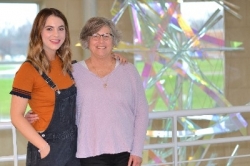 As the newest addition to the Hope Academy staff, Georgia Wynne is coming full circle with her understanding of recovery and how it has impacted her life.
As the newest addition to the Hope Academy staff, Georgia Wynne is coming full circle with her understanding of recovery and how it has impacted her life.
Georgia serves as the school’s recovery coach, using her experience in working a 12 Step recovery program, connection to a great recovery community and celebrating over two years of sobriety to make connections with students.
As long as she can remember, Georgia was always taking the most difficult path in her transition from child to adult. This led to many poor decisions with many negative consequences.
“I wanted to be on the next level with everything I did,” Georgia said. “I was pretending to smoke cigarettes when I was still a child.”
Georgia was drinking in her early teens. At age 14 she was found in possession of marijuana. She was placed in Fairbanks’ Intensive Outpatient Program (IOP) as part of her probation agreement. Georgia completed IOP, but was back to her old ways once she returned to her school.
“I was on the verge of flunking out and just struggling with drugs and alcohol,” she said. “I was reintroduced to the same friends, so nothing had really changed.”
Unfortunately, Georgia’s mom Kathy had seen this before with her oldest son, Cary. He came to Fairbanks for treatment during his senior year of high school. Kathy knew little about addiction at the time.
“I knew he was having trouble, but didn’t know where to go for help,” she said.
“In a way, all of his problems were setting me up to be a better help for Georgia,” Kathy added.
Cary eventually lost his battle with substance use disorder, leaving behind a grieving family, including Georgia.
Georgia dealt with the same ongoing struggles as her brother for several years. After leaving Fairbanks, there were periods where she returned to use, and then returned to treatment. That included enrolling at Hope Academy, the recovery high school at Fairbanks.
At age 16, Georgia finally addressed some underlying trauma with help from a Fairbanks counselor.
“That was a big deal for me,” she said. “For the first time, I was engaged in some internal healing.”
While Georgia had longer stretches of sobriety, she still suffered periods where she returned to use. After enrolling in a boarding school in Arizona, she eventually returned to Indiana, re-engaged with Hope and graduated from the school. Georgia believes she never would’ve finished high school if not for Hope Academy.
“I wouldn’t have made it anywhere else because they didn’t understand me and what I was going through,” she said. “Hope Academy was a safe place for me. I didn’t feel alone there.”
She feels the same way about Fairbanks.
“The staff here helped me with so much,” Georgia said. “I even learned how to do my own laundry here. They helped carry me through a lot of heavy stuff.”
That includes when her brother Cary died. Some of her former counselors at Fairbanks came to the funeral.
“That really meant a lot to me,” Georgia said. “Fairbanks has become a safe place for me.”
They also helped Georgia when Kathy was diagnosed with stage four breast cancer in 2009.
“I equate it to the addiction issues we’ve experienced in our family. It will always be there,” Kathy said of her diagnosis, which is incurable.
She was predicted to live only three to six months at the time, but the retired registered nurse has long surpassed that expectation and continues to do well with treatment.
“I work a strong program for myself,” Kathy said. “I try to live the 12 Steps as part of my philosophy for life. I have a very strong relationship with God now.”
Kathy met others through a parent support group at Fairbanks. She continues to meet with some of them weekly. They call themselves the Serenity Sisters. Georgia wasn’t the only one who was struggling at the time.
“We’ve always been really close, almost like we’re tied at the hip,” Kathy said of her relationship with her daughter. “I was always trying to save her, trying to keep her from all the evil in the world. Deep down, I knew she wasn’t the epitome of what society was seeing in her.”
Georgia now believes her treatment didn’t work initially because she wasn’t ready to buy in to recovery as a lifestyle.
“I could tell you things that are in the Big Book, but I wasn’t yet ready to grow spiritually,” she said. “I don’t think I had experienced enough pain yet. It had to reach the point where my substance use had become scary instead of fun before it really clicked.”
“Before, I arranged my recovery around other things,” Georgia said. “Now everything’s arranged around my recovery. My recovery is No. 1. I finally have self-worth and care enough to take care of myself. I never did that before.”
And as Hope Academy’s recovery coach, Georgia understands and can help students on their recovery journey, so that they can engage with the larger recovery community and can also put their recovery first.
